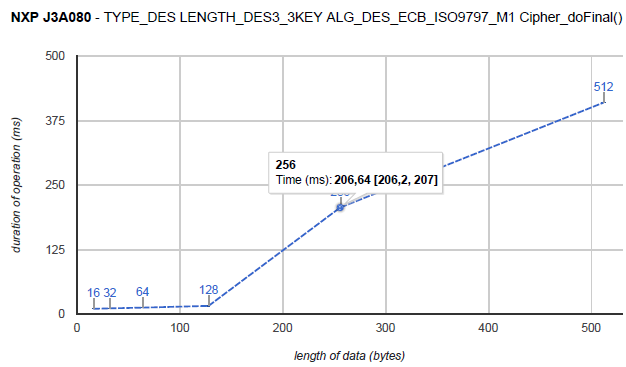Algorithm performance for different length of processed data

The performance of the card and given algorithm changes with the length of processed data. Here we provide detailed performance for relevant methods expected to process input with variable lengths (e.g., Cipher.doFinal()). We measured the execution time for data lengths of 16, 32, 64, 128, 256 and 512 bytes and visualize in a graph. Multiple measurements of the same method and fixed data length are performed to capture its variability.
We also included measurements of several methods usually used together in single sequence (e.g., set key, init the engine and sign the data). Note that resulting time is not simply the sum of operations measured separately as JavaCard Virtual Machine itself influence the results same way as caching and other optimizations do for ordinary CPUs. Used key values are randomly generated to prevent JCVM optimizations by skipping already performed initialization.
Note that as many algorithms are block-based, you will experience almost the same execution time until the length of the process data exceeds the length of internal algorithm block (e.g, 64 bytes for SHA-2 hash) after which significantly more operations are executed to process another full block. Similar behavior but with a different underlying cause can be observed when the length in processed data exceeds the length of engine's internal memory buffers. Finally, it often makes sense to concatenate multiple independent blocks into a buffer and then call processing method only once as actual processing (e.g., encryption) is only part of the operation - context switch between card's main processor and crypto co-processor may be significant.
Click on the target smart card to display its length-dependent performance. If you would like to see measurements of all operations please visit Performance details page.
List of tested Java Cards:
- CardLogix Credentsys lite
- G+D Smartcafe 3.2 72K
- G+D Smartcafe 6.0 80K
- G+D Smart Cafe Expert 4.x V2
- Gemplus GXP R4 72K
- NXP J2D081 80K
- NXP J3A080
- J3H081 EMV
- NXP JCOP21 v2.4.2R3
- NXP JCOP31 v2.4.1 72K
- NXP JCOP41 v2.2.1 72K
- NXP JCOP 21 V2.2 36K
- NXP JCOP 31 V2.2 36K
- NXP_JCOP_J3D081_v2.4.2R2
- Feitian JavaSD
- NXP J3H145 RSA4096
- JavaCOS A40
- JavaCOS A22
- JavaCOS JC10M128C
- NXP CJ2A081
- NXP J2A080 80K
- NXP J2E081
- NXP J3A081 v2.4.1
- Athena IDProtect
- Feitian JavaCOS A20
- G+D SmartCafe 7.0 215K USB Token S
- Infineon CJTOP 80K INF SLJ 52GLA080AL M8.4
- JavaCOS A22 CR
- NXP JCOP3 J3H145 SECID P60
- NXP JCOP4 J3R180 SECID P71
- Taisys SIMoNE Vault